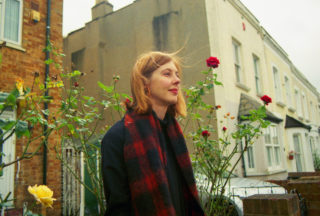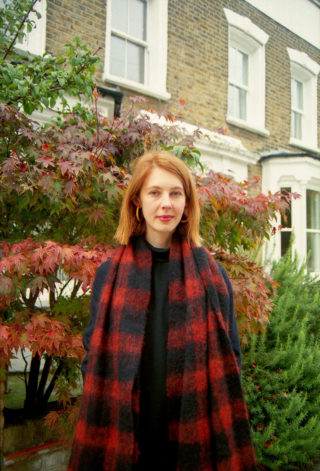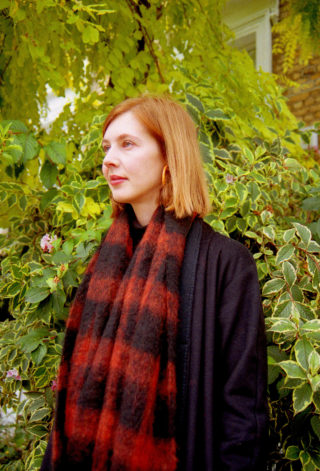Carla dal Forno – mysterious sounds from the other side of a fog-soaked valley
Embracing difficulty, insecurity and darkness when making a song a day

Embracing difficulty, insecurity and darkness when making a song a day
Through the customary wind and rain, devotees make their way to Glasgow’s hallowed ground. But this isn’t the Celtic stadium in Parkhead, and it isn’t the Barrowland Ballroom all up in lights; SWG3, the city’s premier alternative music venue, is hosting a celebration of Optimo – the city’s legendary DJ duo – on their twentieth birthday. It’s a once-in-a-lifetime line up; Nurse With Wound are on the bill, as are ADULT. and King Ayisoba. On the poster, sandwiched between house high priestess The Black Madonna and dancehall oddballs Equiknoxx, is the name of Carla dal Forno.
This was the first time I saw Carla dal Forno live, even if ‘saw’ isn’t quite the right verb. A silhouette alongside her bandmate Mark Smith against Lynchian hues of blue and red, all was still but for her gentle bobbing, pinning down ambient hisses and unwieldy flourishes with a stern, subatomic bassline. Her vocal sauntered over the hum – quietly, but confidently – yet nobody in the room could be sure exactly what she was saying.
Amid the abrasive noise and thumping 4/4s at SWG3 that day, the performance was a thing of mystery. I wasn’t sure what I’d just experienced: a singer-songwriter too shy to cast light over her own performance, or a stark show of ambient music, distributed in short intervals, like the most opaque pop music.
“Any labels are reductive, right?” dal Forno tells me almost three months later over Skype. The mysterious figure is before me – situated in a blank, domestic space – and I’m surprised to find her jovial, if not any less curious, rarely stating anything definitively. “I think I want to create a space in my music. If the environment isn’t right, what you’re trying to convey in the song isn’t going to be captured.” She scoffs at her own abstruse comment, but it must be irresistible not to appeal to some kind of vague mysticism, especially when your work seems caught between multiple places, with a slippery point of origin.
Having started playing guitar “as something to do in my spare time” while studying at the University of Melbourne, dal Forno quickly fell into the city’s vibrant lo-fi “not quite pop” scene. “There’s always a lot of bands in Melbourne – it’s a massive music scene for the size of the city and the population,” she says, recalling a start in music that seems as amorphous as it was humble. “Friends in bands would show me their songs, which I found really inspiring – someone writing out their lyrics and saying ‘here are the three guitar chords.’ I knew two of them, so I would give it a go.” More by osmosis than bloody-mindedness, she played her first show shortly after joining her first band.
She’s more surprised than anyone that she got a taste for it. “When I started making music in Melbourne, I was making it for 50 people, and I was happy with that.” But, like many other Melburnian musicians (Nick Cave, Dead Can Dance, Dirty Three, King Gizzard), dal Forno was ready to find a bigger audience, and the move to Europe seemed like the logical next step. “It took a long time for me to think I should take this to a different place,” she says. “[The scene] was very nurturing, but also very insular – you don’t see many new faces.”


Having collaborated with various musicians – the most oft-cited being fellow Melburnian Tarquin Manek – a cassette of noise folk by her group F INGERS eventually made its way to Kiran Sande at UK label Blackest Ever Black. Today, it’s safe to call dal Forno one of the label’s flagship artists.
I say ‘flagship’, but dal Forno seems more content with squirreling herself away. “I’m not the person who’s talking the loudest, or the one with the most to say,” she says, wholly unsurprisingly. The title of her 2016 debut, ‘You Know What it’s Like’, proved to be antithetical to its hazy content – a record of more questions than answers, made more puzzling by its air of manacled necessity. Through the mist of tape noise, cobbled drum machines and screeching flutes come to life, while the varying sounds of pouring water – rain, from a jug into a tall glass – ease in and out of earshot, as dal Forno’s obscured vocal calls out from an abyss. Her message? It seems like we don’t know the half of it.
Latest EP ‘The Garden’ sees dal Forno lifting the veil – if only about an inch. Where the vocals of ‘You Know What It’s Like’ seem to have come from underneath a body of water, those of the ‘The Garden’ appear to have at least come from the other side of a fog-soaked valley. In other words, it’s just slightly… louder. “I had a sound card this time,” she says, “which can add higher fidelity.” But the EP is perhaps also the site of resurgent confidence: “it’s entirely self-produced, whereas my album had a co-producer. I probably spent as much time working on the EP – I was doing it all myself and I had a lot to learn.”
Luckily, the songs were already there – but not without the hard graft. “I find that making a song a day generally works,” she says. “It’s hard because you spend the whole day being like ‘this is shit – what am I doing? I suck.’ Sometimes you get to the end of the day and think that was a complete mess, but other times things come together.” She pauses, as if ready to drop a bombshell. “I feel like the difficulty and the insecurity is just part of the process.”
Much of her new EP was born out of need – built from material intended to meet the demands of an ever-lengthening live show. It’s odd to think of music so steeped in mood – worn, fatigued – as being able to fly in a live environment at all. “It can be [difficult],” she says. “I feel like I still play shows where I think ‘fuck that was shit’, but now I play shows I’m really happy with as well.”
I ask if there are any plans to branch out further with a full band?
“Maybe we’ll get more musicians, to try and make it… even more live. I’m not really at a level yet where I can think about doing that though.”
The bold title track of ‘The Garden’ finds dal Forno pushing her minimal craft to its limits. Containing elements lifted from the track of the same name by German industrial pioneers Einstürzende Neubauten (“I can’t say it either,” she laughs), a shoestring synthesizer wilts underneath an austerely functional bass part, as the audible clacking of the strings keeps time. “Initially, I didn’t plan it as a reinterpretation,” she admits. “I was just going to steal this idea of being in the garden and nobody would be any the wiser. If I’m being honest, every track that I’ve written has started with some sort of borrowing from other artists’ ideas. It’s probably a common thing… maybe.” Certainly there wouldn’t be a Pavement without The Fall, but it’s oddly pertinent to think of no Carla dal Forno without Blixa Bargeld and his band. With both acts, sibilant, lo-fi recording devices are as much an instrument as a bass guitar, and a full percussion set can consist of ghostly drum machines and indistinct household objects (invariably struck by other indistinct household objects).
But it’s clear that dal Forno and Bargeld come from different viewpoints lyrically. You won’t find Bargeld in the garden when it’s raining, but there you’ll find dal Forno – “day and night, I’m always outside / I’ll stay out here, through rain or shine.” She tentatively speculates this contrast: “maybe I wrote lyrics that would be a metaphor for some other personal experience of being in the world. I talk about the threat of being outside at night – the creepiness.” A phrase in the EP’s press release, which at first I dismissed, suddenly chimes at the back of my mind: “an acutely female perspective is brought to bear” in dal Forno’s version of the song.

Far from nicking anything outright, dal Forno sets up hitherto undiscovered and related constellations – of her own enshrouded sound and the realm of harsh industrialism. Better to think of dal Forno’s ‘The Garden’ as a tribute to the European avant-garde, right down to its referential music video, which features the artist kitted out in Bargeld-style funereal black and a large-rimmed hat, her head bowed like a haunted scarecrow, lifted along with her palms every time she opens her mouth to sing. “When darkness falls, there’s so much more to it / the wild shapes are in my eyes.”
Remarkably, despite its theatrical nature, the Carla dal Forno of this music video finds the artist at her most discernable – or perhaps it’s the first time she’s noticed us watching. The Carla dal Forno of previous music videos for ‘What You Gonna Do Now’ and ‘Fast Moving Cars’ was reserved, constantly seen from behind; followed on board the U-Bahn in Berlin, or to an outback lake in rural Australia. “They came out with this real stalker vibe – there’s a sense of the unknown or a sense of threat,” she smirks. We felt we shouldn’t be looking, and that was the point. But the Carla of ‘The Garden’ demands that we meet her gaze. If anything, it’s even creepier.
“I’m more of an observer, naturally,” she reflects. “But [‘The Garden’ EP] felt more direct, and I felt the clips should be too. I couldn’t make another film clip where someone followed me around.” Moving beyond your instincts, she says, is all part of progressing as an artist: “if you want to keep creating new and interesting work, you have to change it up by doing things that make you nervous – and making the film clip was my way of doing that.”
It’s been a hugely busy year since the release of her debut LP – she’s hosted a regular show on NTS (“I don’t really consider it DJing; there’s enough DJing in the world at the moment”), and shared illustrious bills all over Europe. I get the impression that she’s finally drawing a line under everything in anticipation of the next bit – whatever it may entail. “I’ve got a clean slate at the moment,” she says, and the relief is palpable. After another go-around of Europe she’ll see the year out in relative quiet with Christmas back home in Australia. Yet, she doesn’t seem like someone who turns off very easily; in her immediate future, she’s off to pick up a synthesizer. Before I get my hopes up, she’s quick to dispel any speculation that we’ll hear any new music from her before 2018. “I find I get disheartened when I try and make something when I’ve got other stuff I need to do.” Fair enough.
In contrast to the speculative person I spoke to minutes before – and to the ominous, silhouetted figure I saw at SWG3 nearly three months ago – Carla dal Forno suddenly strikes me as someone who knows herself and her art. After a brief ‘are you winding things up yet?’ interruption from her flatmate, dal Forno adds conclusively, “I make DIY music. You may lose high fidelity richness by giving up higher production values – and in doing things differently, you turn your back towards that world – but if you’re doing things yourself, there’s an intimacy of direct, personal communications. Other people’s ideas or visions don’t get in the way of what you want people to see.” Here, she breaks her calm for a more spirited tone of voice. “That’s my philosophy on it.”